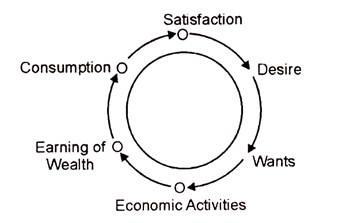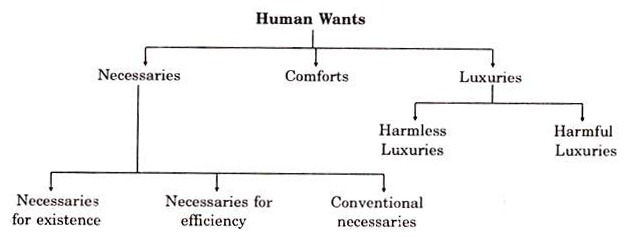Let us make an in-depth study of Human Wants:- 1. Definition of Human Wants 2. Elements of Human Wants 3. Relationship with Economic Activities 4. Importance 5. Classification.
Definition of Human Wants:
In ordinary sense the word ‘desire’ and ‘wants’ are considered as one and there seems to be no difference between the two.
But in economics there is difference between ‘desire’ and ‘wants’. Consumption is related to the study of human wants.
All economic activities are directed to the satisfaction of human wants. In this way wants has significance in the study of economics. Generally want is related to desire. But all desires are not want. Want is those desire for which the man has capacity and also willingness to fulfill those desire.
ADVERTISEMENTS:
In other words want is the effective desire for the satisfaction of which man has both capacity and willingness.
According to Penson—”Wants are defined as effective desire for particular things, which expresses itself in the effort or sacrifice necessary to obtain them.” Regarding wants eminent economist Erich Roll has said—”Want is the expression of lack of satisfaction which leads to action designed to provide that satisfaction.”
In economics desires are of two types:
(i) Effective desires,
ADVERTISEMENTS:
(ii) Ineffective desires.
Effective desires are those in which man must have sufficient means to spend and there must be willingness in the man to spend; while Ineffective wants are those which cannot be satisfied. For Example—To bring sun and moon in the room.
Therefore, only effective desire are said to be want. For example—suppose, a poor man has desire to purchase a car but his desire cannot be called wants because he has not got means to purchase the car. But suppose a miser has a desire to pin-chase a car but his this desire cannot be called wants because the miser has not got the willingness to purchase it.
Therefore, in economics wants is that effective desire for particular things which expresses itself in the effort or sacrifice necessary to obtain them.
Elements of Human Wants:
Following are the important elements of wants:
ADVERTISEMENTS:
(i) There must be desire for a commodity.
(ii) For fulfillment of desire there should be means or ability to purchase.
(iii) There must be willingness to purchase the article.
Difference between Wants and Demand:
All people do not have the same wants. Wants always vary from individual to individual. They are relative to one’s social and economic position. They are also the outcome of one’s education, temperament and tastes. The modern man is the product of a long process of evolution which is reflected in his endless and ever growing wants.
Sometimes wants and demand are taken in the same meaning but there is basic difference between want and demand. Want is the effective desire that is desire with ability and willingness where as demand is the effective desire backed with a price of the commodity. Economists have said that demand is that wants which is expressed and backed by a fixed price in a particular time.
Relationship of Wants and Economic Activities:
There is an intense relationship between human wants and economic efforts. When a man feels the need of anything, then to fulfill if he puts in economic efforts and tries to earn wealth in order to satisfy the wants. In this way Wants are the basis of all economic activities of the society. If there would not have been wants, then the present economic shape of the society would have been different.
Wants not only gives birth to economic activities but it determines its effect also. If the number of wants will be less than our economic efforts and activities will be less. On the other side if our wants increases our economic efforts and activities increases.
For example:
ADVERTISEMENTS:
When man used to live in forest his wants were limited and his economic activities were circumscribed. But with the growth of civilisation and time our economic activities increased and we started labouring hard in order to earn more wealth to satisfy our wants. In this way through our economic activities we try to meet and satisfy our various wants.
In this way in human life Desire —> Wants —> Economic activities —> Earning of wealth —> Consumption Circle of satisfaction goes on moving.
From the facts written above it can be ascertained that there is close relationship between wants and economic activities. It is wants only which encourages and creates incentive in man to perform or to do economic activities. But, here we do not forget that economic activities also affect human wants. Because it is the result of economic activities that the economic development of a country takes place. Thus, in human life the circle of wants and economic activities goes on moving.
Importance of Human Wants:
ADVERTISEMENTS:
Following are the importance of wants:
1. Want is the Starting Point of Economic Efforts:
Want is the mother of invention and is the root of all economic activities. It is the human wants that compels a man to do economic activities in order to earn wealth to meet the various wants. To earn wealth a person does service, work as labourer or he goes to business. If there would not have been wants, then man would have been inactive.
2. All Economic Activities are done to Satisfy Wants:
Economics is the study of human wants and is the means to satisfy wants. The main object of all economic activities of a man is the satisfaction of wants. If there will be no wants, then no one will perform economic activities.
3. Determination of Living Standard:
Human wants has got direct relationship with the standard of living of a man. If more human wants are fulfilled, then standard of living will be high and if human wants are not met, then standard of living will be low.
4. Index of Economic Progress:
ADVERTISEMENTS:
Human wants have been considered as an index of economic progress. Any man or his country is considered as economically advanced or modern if he is in a position to meet his wants satisfactorily.
5. Rapid Industrialisation:
Rapid industrialisation of a country is possible only when the people of that country are in a position to meet their various wants. Rapid industrialisation will reduce unemployment, will increase income and this will help in increasing the standard of living.
Classification of Human Wants:
All wants of a man cannot be of a similar nature and their importance cannot be of the same nature. Some wants of a man be very essential and some may be less.
On this basis wants may be classified as follows:
1. Necessaries.
2. Comforts.
ADVERTISEMENTS:
3. Luxuries.
Necessaries can again be divided under the following three heads:
i. Necessaries for existence,
ii. Necessaries for efficiency, and
iii. Conventional necessaries.
Wants related to luxuries have been divided under two heads:
ADVERTISEMENTS:
(a) Harmless Luxuries,
(b) Harmful Luxiries.
Necessaries:
Comforts are those necessaries, the satisfaction of which not only provide better living and comforts of life but it increases social prestige and better standard of living.
For example:
ADVERTISEMENTS:
A book is necessity for a student, a table and a chair are necessaries of efficiency but easy chair or a cushioned chair is a comfort. Comfort makes life better and fuller. There is a difference between comforts and necessaries. From the money spent on comforts we derive less benefit in comparison to necessaries. Expenses over necessaries give the benefit in health and increase our efficiency. For example—an electric fan for a college student in summer may be regarded as a necessary of efficiency, an air conditioner will be comfort and may be even luxury.
Luxuries:
According to Chapman “Luxuries are things which when consumed do not appreciably add to and may even detract from a person’s efficiency.” It has been called as a ‘superfluous consumption’ i.e., something we could easily do without it. Prof. Gide has said—”Luxuries are superfluous wants.” Prof. Ely has given the name as “Excessive Personal Consumption.” Economists are of this opinion that money spent on comforts brings some compensation, while the expenditure on luxuries brings less or negligible return. In other-words, we can say it is a positive loss or harm.
Luxuries are of two kinds:
(i) Harmless Luxuries:
Harmless luxuries are those luxuries, the use of which neither gives any loss to the consumer nor it increases any working efficiency of the man.
ADVERTISEMENTS:
For example:
Use of costly clothes, palatial building, motor car etc.
(ii) Harmful Luxuries:
Harmful luxuries are those the use of which reduces the working-efficiency of the man and it becomes injurious for time after sometime.
For example:
Use of wine or any intoxicated material, this reduces the working efficiency of a man and after sometime it becomes injurious for health. The use of such material has not been considered proper from social and moral point of view.
Is Classification of Wants Relative?
Economists are of view that classification of wants is not absolute but are relative and flexible. The reasons of the classification is not the quality of the articles but the basis of classification is the situation and circumstances of the man, in which he is living, his income, his profession, customs and wages, social and physical conditions etc.
In this connection Prof. Richards has said—“The terms necessary comfort and luxury are, however, relative terms. An article that was regarded as luxury in civilized communities a hundred years ago, may as a result of a rise in the standard of life now be deemed as necessary”?
In this connection it must be remembered for that we cannot attach permanent and fixed types of necessaries, comforts or luxuries to commodities. We cannot say that car is always a luxury and that a shirt is always a ‘necessary. The same thing may be a necessary for one and it may be luxury for others.
To a public school child, a certain type of dress is necessary, where as for a villager, the same may be regarded as a luxury. A car may be a luxury for a person living in a small city like Gaya, Jehanabad but for a busy official or doctor in a large city like Pune and Bangalore it is necessary.
The luxuries of yesterday have become the conventional necessaries of to-day. This is but a natural consequence of rising standard of living and growing prosperity. Further, the amenities which were enjoyed by higher classes in the past are now being considered as necessaries by the working classes of to-day.
For example:
Electricity, news-paper, furniture. In the same manner what may be regarded as a luxury in India may be a necessary in England. Overcoats or electric heaters are luxuries here, it is necessary in European Countries. In the end we can say that goods are necessaries comforts or luxuries according to the climate, country and the people whom we are considering. They are relative to person, time and place.

